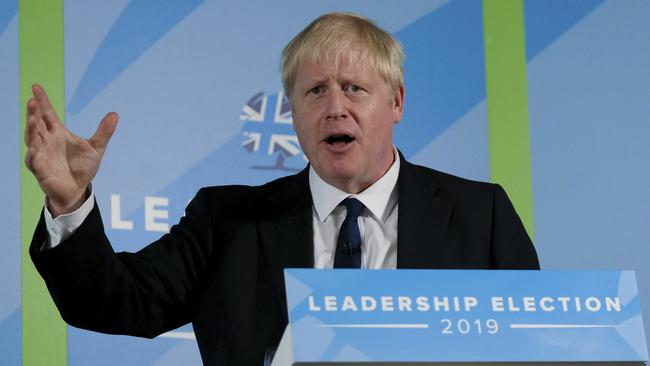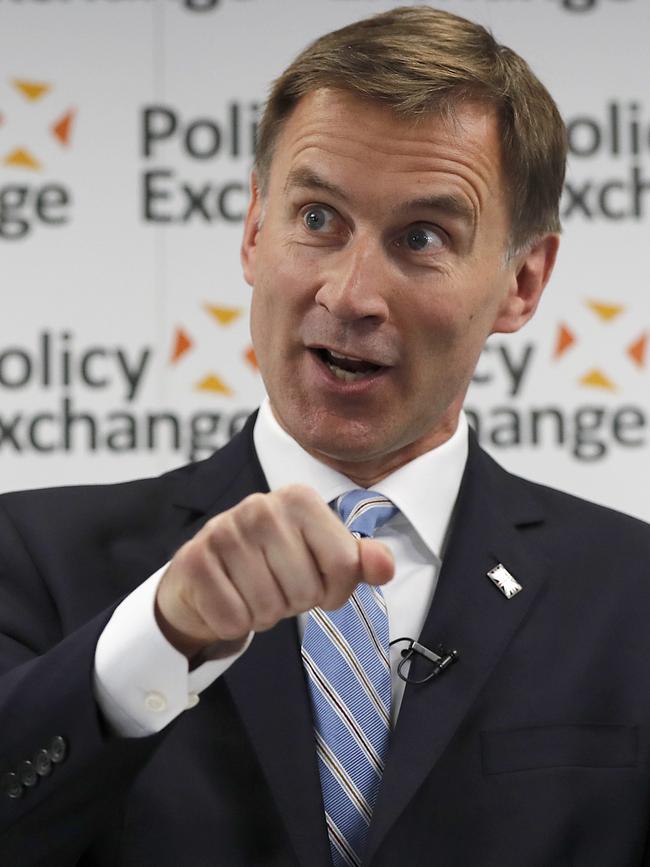Brexit no longer about Brussels, it’s about betrayal and trust

The populist anti-politics message that was always implicit in the Leave campaign is now the explicit anthem of the Brexiteers. Boris Johnson has promised to leave the EU on October 31 “do or die” because he believes that this is “fundamental to trust in politics”. Jeremy Hunt said at the weekend that he was willing to see businesses go bust in a “no-deal” scenario because “if we don’t do what the people tell us to do we’re not a democracy”. This is no longer about Brussels, it’s about betrayal.

There is, however, absolutely no popular or parliamentary mandate for leaving the EU without a deal. Only 28 per cent of voters favour a no-deal Brexit, according to the latest YouGov poll for The Times, and just 8 per cent of those aged 18 to 24, a figure that should terrify the Conservative Party which is already struggling to win over younger voters.
Mr Johnson wrote in The Daily Telegraph in January that leaving without a deal, and relying on World Trade Organisation rules, was “the closest to what people actually voted for” in 2016, but this is simply not true. In the run-up to the referendum the official Vote Leave campaign ruled out a no-deal Brexit. One leaflet stated: “Taking back control is a careful change not a sudden stop — we will negotiate the terms of a new deal before we start any legal process to leave.”
Another briefing paper stressed that there would be “a new UK-EU treaty based on free trade and friendly co-operation” if the country voted to leave. And although Mr Johnson now insists on a hard deadline of Hallowe’en, Vote Leave argued at the time of the referendum that “our guiding principle should be ‘safety first’ and flexibility”.
Nor did the voters sign up to a no-deal Brexit at the 2017 general election. The Tory manifesto promised “the best possible deal for Britain as we leave the European Union delivered by a smooth orderly Brexit”. What’s more, parliament has rejected a no-deal departure and would do so again — the 17 Tory MPs who voted against crashing out in March would be bolstered next time by many of the 12 frontbenchers who abstained then, as well as others such as Rory Stewart, the international development secretary, who voted with the government last time. There is no democratic consent for a no-deal Brexit, quite the opposite: a prime minister who pressed ahead with leaving on those terms would be attempting to bypass both parliament and the people. It is extraordinary that the Eurosceptics, who once waxed lyrical about parliamentary sovereignty, are now seriously discussing suspending the House of Commons to overcome MPs’ opposition to crashing out of the EU on October 31.
The Tory leadership contest has turned into a bidding war on Brexit, with no-deal as the virility test. One cabinet minister says the definition of what it means to be a Brexiteer in the Tory party is hardening and that “no-deal is becoming the authentic Brexit option”. Some blame entryism by Brexit Party supporters in local Conservative associations for the shift in attitudes. MPs who have voted to leave, such as David Gauke, have faced attempted deselection because their Euroscepticism is seen as insufficiently pure by an increasingly hardline membership.
At the weekend Make UK, which represents manufacturers, described a no-deal Brexit as an act of economic vandalism that would do enormous harm to businesses and families. The government’s own analysis found that many of the areas that voted to Leave would be hardest hit, with the northeast 16 per cent poorer. Liam Fox, the international trade secretary, also admitted yesterday (Monday) that there was a “real threat” to the Union from leaving without a deal. Yet a large chunk of Tory party members now see this as the only acceptable outcome.
The party of business and economic competence has been forced into extraordinary contortions to justify a policy driven by ideology rather than pragmatism. Yesterday (Monday) Mr Hunt, the supposed moderate in the leadership contest, promised to mitigate the impact of tariffs that would be imposed in a no-deal scenario with pounds 6 billion worth of funding for those who would be hardest hit. “If we could do it for the bankers in the financial crisis, we can do it for our fishermen, farmers and small businesses now,” he said.
There is, though, a big difference between responding to an external emergency and deliberately plunging the country into a crisis that could have been avoided. As one Tory MP puts it: “If we pursue a no-deal Brexit we would be actively choosing to put the country on a war footing because it serves our narrow party interest to try and ward off Nigel Farage. The electorate will see through that and punish us.”
Patrick Minford, the Brexiteers’ favourite economist, once told a committee of MPs that the car industry would have to be “run down” in the event of a hard Brexit, just as the coal industry was phased out. “These things happen as evolution takes place in your economy,” he said.
The Tory party is still paying the price in some parts of the country for the brutality of the pit closures in the 1980s and it will suffer at the polls if it sacrifices jobs now for the sake of a Eurosceptic dream. The divisions of the past three years would almost certainly be deepened by a reckless rupture with the EU.
Mr Johnson and Mr Hunt are thinking only of the 160,000 party members who will choose the new Tory leader over the next three weeks, but a new prime minister, elected by less than 0.25 per cent of the population, will not be forgiven if he imposes a version of Brexit on the country that was never discussed in 2016 and is opposed by a majority of the voters and MPs.
As one pro-European former minister says: “That’s not democracy”. In fact, you could call it an establishment coup.
The Times



The Brexit Party is about “far more, now, than just leaving the European Union”, says Nigel Farage. It is “about the very democratic system in our country”. In the run-up to the European elections in May only one of his 212 Facebook posts celebrated the virtues of Brexit; the rest were about the threat to democracy of ignoring the 2016 referendum result. The leaflets posted through doors by his party said: “Politics is broken. Let’s change it for good.” Instead of railing against immigration, its website now promises a “democratic earthquake” to turn “anger into hope”.